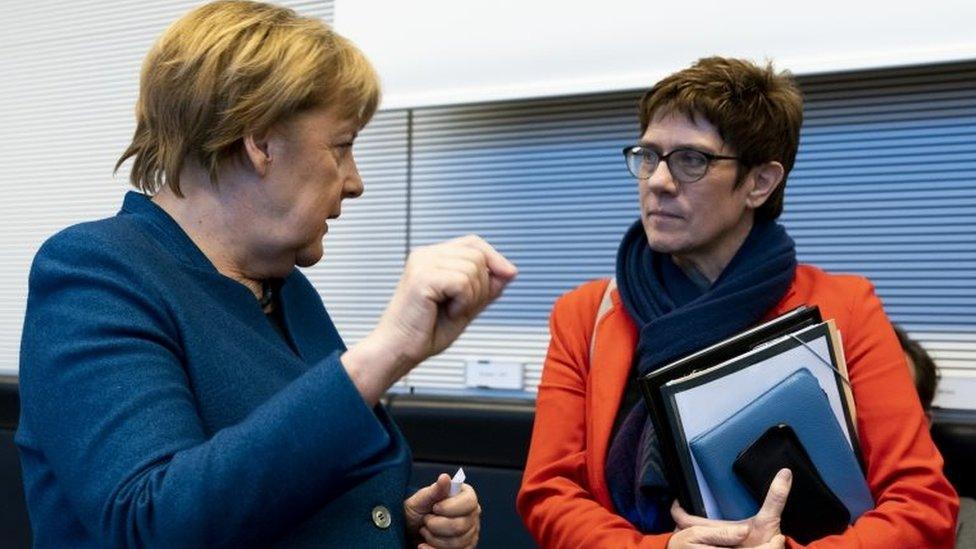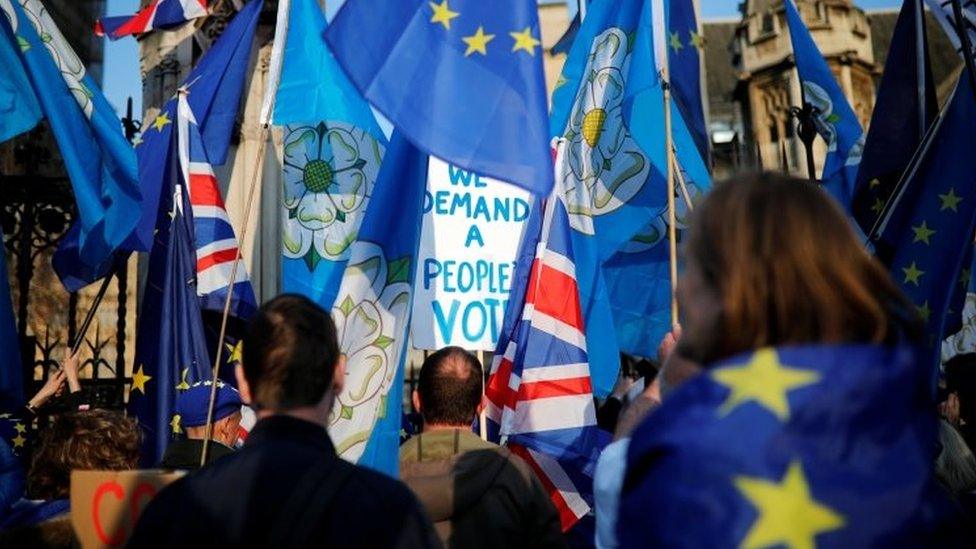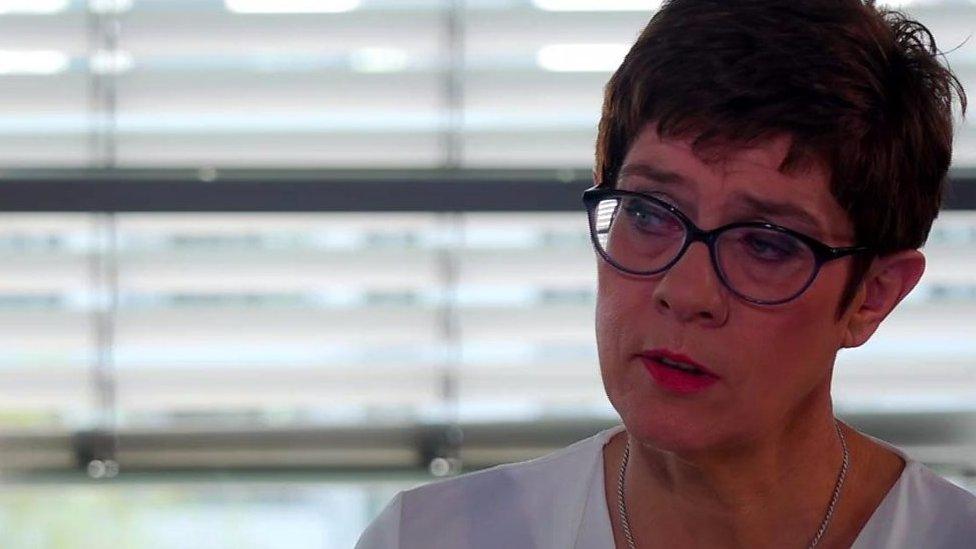Brexit: Germany's CDU leader hopes for second referendum
- Published
Annegret Kramp-Karrenbauer: "Brexit has been a strain on all of us"
"Have you heard about the British party guest? He's the one who announces he's leaving, then you find him hours later wandering around the house with no money for a taxi. When he finally goes, he takes two bottles of wine with him."
European stereotype depictions tend to portray Germans as lacking a sense of humour.
But in political cartoons and on satire shows like Extra 3, Germany is finding plenty to laugh about Brexit.
"Fisch und Tschüss" is a slogan for the satirical news programme, The Heute [today] Show - a play on words for the traditional UK dish, fish and chips. Except Tschüss in German means goodbye.
After initially mourning the UK's vote to leave, then following every twist and turn of negotiations for a while, many Germans now feel alienated from the process.

Annegret Kramp-Karrenbauer (right) is very close to Angela Merkel (left) and is widely tipped to be the next German chancellor
They can't keep up with what's going on in the House of Commons.
"I no longer care so much how Brexit ends," you often hear. "As long as it ends."
"Brexit has been a strain on all of us. In some ways it has paralysed us," Annegret Kramp-Karrenbauer told me in Berlin in a UK exclusive interview.
She's the leader of Germany's CDU party, very close to Angela Merkel and widely tipped to be the next German chancellor.
Ms Kramp-Karrenbauer - also known as AKK - is far from detached when it comes to Brexit.
She and a number of other German politicians penned a letter to the Times newspaper back in January, appealing to the UK to change its mind.
Now, the EU's determined attempt to show unity at all times over Brexit means it has been frustratingly difficult to get EU leaders to agree to in-depth, on-the-record Brexit interviews .
But AKK is not the German chancellor. She had no qualms about laying bare her Brexit regret.
"Anything that keeps the UK close to the EU and best of all, in the EU, would make me personally very happy" she told me.
"Maybe that could result from the current talks between Theresa May and Jeremy Corbyn."
She hopes for a second referendum - but only, she said, if the majority of UK citizens felt it would heal the country rather than exacerbate divisions further.

Remain supporters have been staging rallies in London
With the deadline for a Brexit decision looming next week on 12 April, Ms Kramp-Karrenbauer believes the risk of the UK leaving without a deal have "risen dramatically". This is something German business find no laughing matter.
A recent poll suggested 100,000 German jobs could be affected by a no-deal Brexit.
The BDI Federation of German Industry warned Germany would lose at least 0.5% of its GDP - and this at a time when the German economy is already heading south.
That, I think, is why there is a sudden, noticeable softening in tone when EU leaders speak about Brexit.
At a press conference in Dublin on Thursday, Chancellor Merkel struck a determinedly encouraging note.
Instead of "no-deal is the most likely scenario" or "if Theresa May requests a longer extension, we'll attach really tough conditions", which we've got used to hearing by now, Mrs Merkel chose the words: "Where there's a will, there's a way."
Peering into the abyss of a no-deal Brexit over the last few days, EU leaders have had a short, sharp reality check.
What impact would that have on them and their countries, they wonder? And what are they be prepared to do to avoid it?
There is no common EU position on this yet. That's putting it politely.
Verbal fisticuffs are predicted at next week's emergency Brexit summit when the 27 EU leaders come face-to-face.
The man who represents all of them here in Brussels, President of the European Council Donald Tusk, thinks he may have found a solution. However, it doesn't exactly roll off the tongue.
He's proposing what he calls a "flextension", which could see the UK signing up to a one-year-long Brexit delay with the option to cut it short as soon as parliament ratified the Brexit deal.
Mr Tusk believes the arrangement would suit the EU and the UK - and as one EU official put it to me, it would avoid Brussels potentially being faced with "endless" UK requests for repeated short extensions every few weeks.
EU leaders will discuss Mr Tusk's proposal at next Wednesday's summit. By law, their decision must be unanimous.
Annegret Kramp-Karrenbauer suggested something else the EU could do: take another look at the controversial backstop guarantee to keep the Irish border open after Brexit.
"If the UK now came to us and said, 'let's spend five days negotiating non-stop on how to avoid the backstop', I can't imagine anyone in Europe saying 'No'. If the UK had new watertight proposals for the border, I don't think anyone in the EU would say, 'We don't want to talk about it.'"
Far from official EU Brexit policy, but it gives us a taster of the kind of conversations going on behind closed EU political doors.
- Published5 April 2019

- Published30 March 2019
- Published30 July 2019

